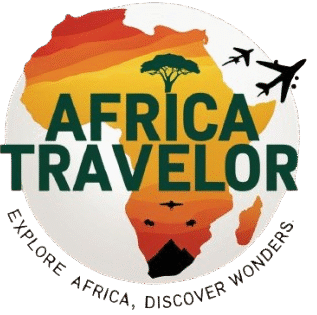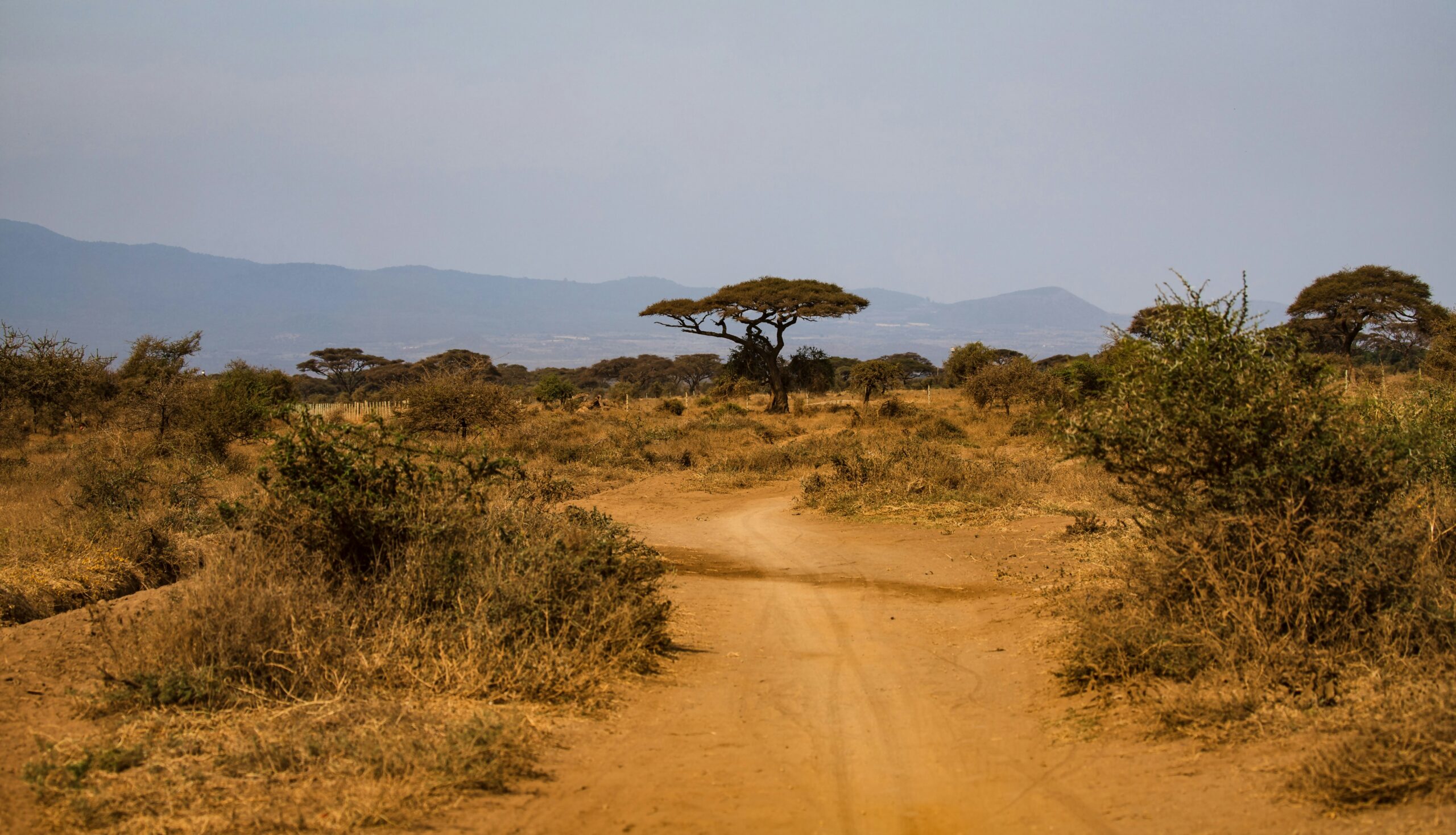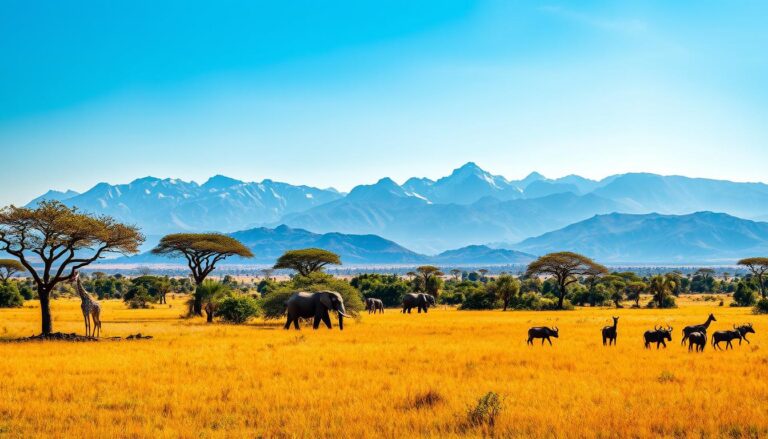Safest Countries in Africa for Travel
Start your journey to find the safest spots for your next African safari adventure. Africa is full of diverse wildlife and stunning landscapes. It’s perfect for travelers looking for unique experiences.
Our guide focuses on a safe and fun trip. You’ll learn about the top places, safety tips, and unforgettable experiences. Discover the best spots to visit and get expert advice for your safari in Africa.
Africa offers something for everyone, from amazing wildlife to rich cultures. Prepare to make memories that will last a lifetime on your next adventure.
Understanding Safety in African Travel
Exploring the many safari destinations in Africa is exciting. But, it’s important to know how to stay safe. This knowledge will make your trip even better.
How Safety is Measured in African Countries
Several factors measure safety in African countries. These include crime rates, political stability, and health concerns. Governments and tourism boards work hard to keep tourist areas safe. They use tourist police and safety rules at national parks and other spots.
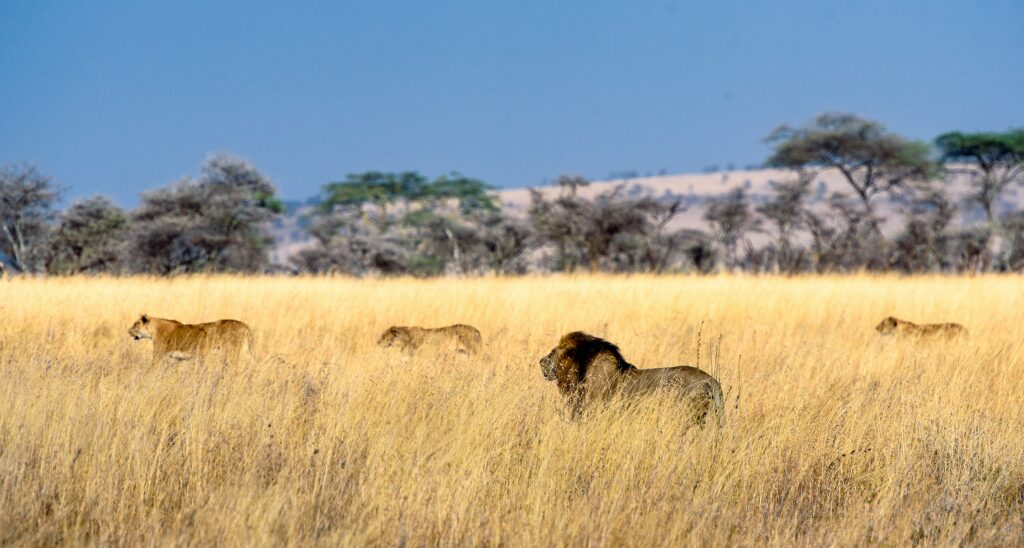
Common Misconceptions About African Travel
Many people think African travel is dangerous, thanks to media reports. But, most of Africa is safe for tourists. Many countries are working hard to make it safer for visitors.
What Makes a Country Safe for Tourists
A country’s safety for tourists depends on several things. It needs to manage crime well, keep politics stable, and offer good health and safety services. Countries that focus on tourism and safety are best for a wildlife safari adventure.
Top 5 Safest Countries for Safari in Africa
Planning a safari in Africa means choosing places that are both beautiful and safe. The continent has many countries with great safari experiences. But some are safer and more focused on conservation.
Botswana: The Peaceful Diamond
Botswana is famous for its untouched wilderness and top-notch safaris. It’s a leader in conservation and low-impact tourism. This makes it a safe place for wildlife and tourists alike. The Okavango Delta and Chobe National Park are highlights, with unforgettable adventures.
Rwanda: The Remarkable Turnaround
Rwanda has become a safe and appealing place for tourists. Its national parks, like Volcanoes National Park, offer a chance to see mountain gorillas and other wildlife. Rwanda’s focus on conservation and community tourism has made it safer and more attractive.
Namibia: Desert Wilderness Security
Namibia is known for its vast, untouched landscapes and safety. Etosha National Park and the Namib Desert are top spots, with great wildlife viewing and scenery. Its low crime rate and stable politics make it perfect for safaris.
Tanzania: Serengeti Safety
Tanzania is home to famous national parks like the Serengeti and Ngorongoro Crater. The country’s commitment to conservation and tourism ensures a safe visit. Tanzania’s diverse landscapes and wildlife make it a favorite for safari lovers.
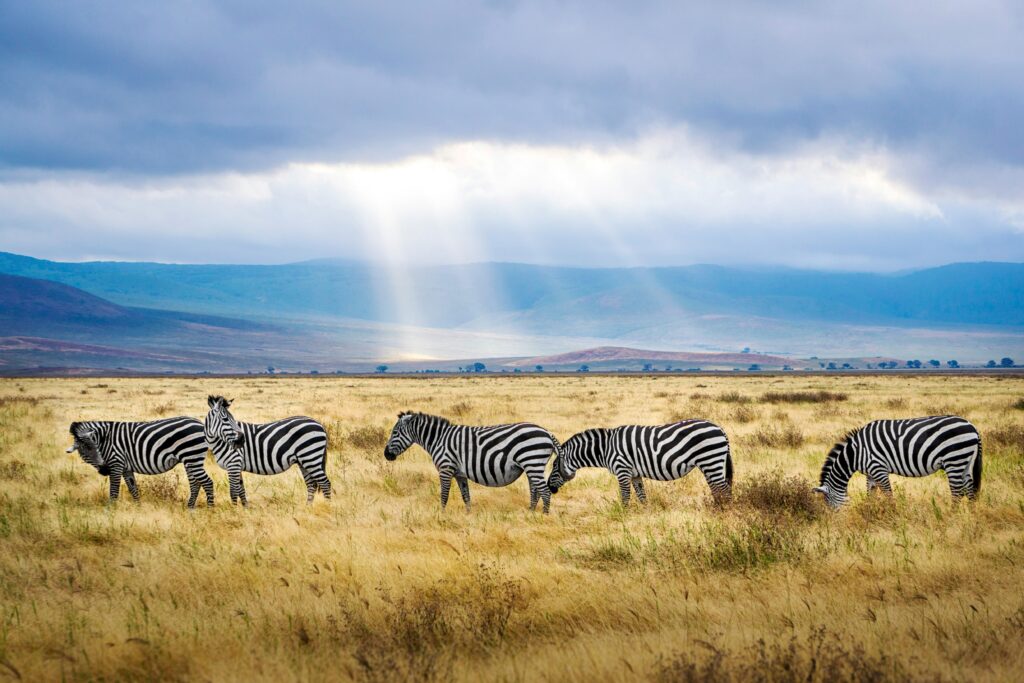
Morocco: Northern African Gem
Morocco is a unique mix of African, Arab, and European cultures. It’s not usually known for safaris, but its national parks and deserts offer exciting exploration. Morocco’s strong tourism infrastructure and focus on security make it a safe choice.
Each of these countries offers a unique and safe safari experience. Whether you prefer Botswana’s lush deltas or Namibia’s deserts, Africa’s top safari spots promise an unforgettable journey.
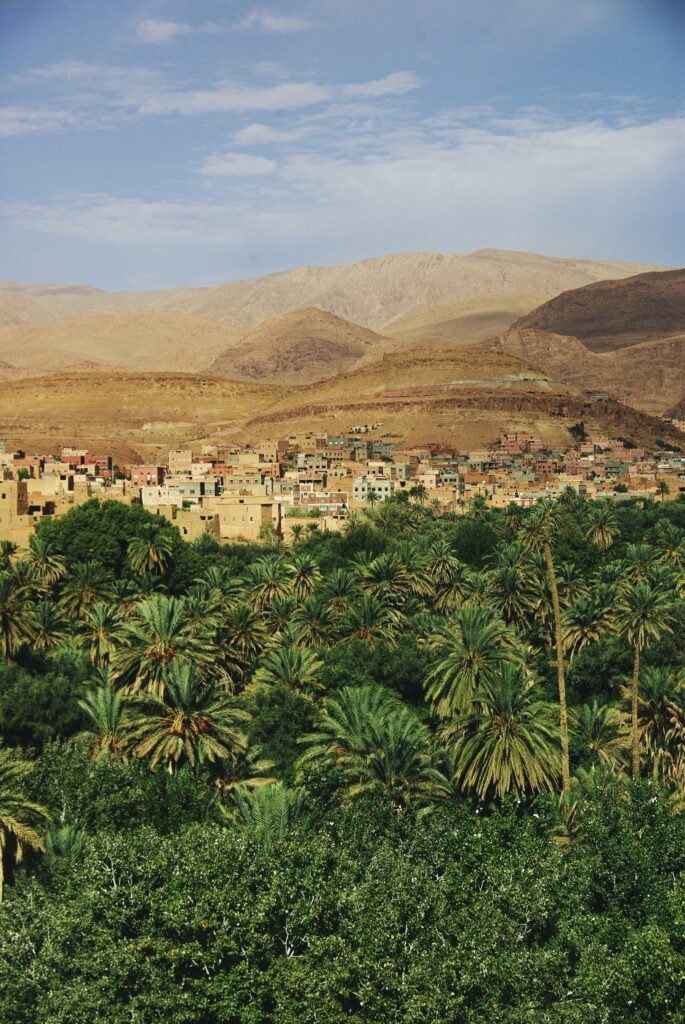
| Country | Main Attractions | Safety Features |
|---|---|---|
| Botswana | Okavango Delta, Chobe National Park | Low-impact tourism, conservation efforts |
| Rwanda | Volcanoes National Park, mountain gorillas | Community-based tourism, conservation focus |
| Namibia | Etosha National Park, Namib Desert | Low crime rate, stable political environment |
| Tanzania | Serengeti National Park, Ngorongoro Crater | Conservation efforts, tourism infrastructure |
| Morocco | National parks, desert regions | Well-developed tourism infrastructure, strong security |
Botswana: Premier Safari Destination
Botswana is known for its untouched beauty and rich wildlife. It’s a top choice for safari adventures. Travelers from all over come for the luxury safari and safari lodges.
Okavango Delta Adventures
The Okavango Delta is a must-see on any Botswana safari. It offers water-based safari experiences that are both exciting and peaceful. You can explore by canoe or motorboat, seeing many animals along the way.
Water-Based Safari Experiences
Try a mokoro (dugout canoe) safari for a quiet ride. Or, take a motorboat for a faster adventure. Both ways give you a special view of the delta’s world.
Wildlife Viewing Opportunities
The Okavango Delta is full of wildlife. You’ll see elephants, crocodiles, and many birds. It’s a dream spot for nature fans and photographers.
Chobe National Park Experiences
Chobe National Park is famous for its elephants and diverse animals. Here, you can see these huge creatures in their home.
Safety Tips for Botswana Travel
To have a safe and fun trip to Botswana, remember these tips: Stay in the safari areas, keep a distance from animals, and listen to your guide. Also, protect yourself from malaria and other health issues.
Rwanda: Gorillas and Growth
Rwanda is a unique safari adventure spot in Africa. It has rich biodiversity and focuses on conservation. The country has become a safe and welcoming place for tourists, showing its growth and eco-tourism commitment.
Volcanoes National Park
Volcanoes National Park is Rwanda’s gem. It offers an unmatched wildlife adventure. Visitors can trek through forests to see mountain gorillas in their home.
Gorilla Trekking Safety
Gorilla trekking is done with great care. Guides are skilled, and rules are strict. This ensures a safe and enriching visit for everyone.
Conservation Efforts
Rwanda has made big strides in conservation. It focuses on protecting mountain gorillas. These efforts help the species recover and support local economies through sustainable tourism.
Nyungwe Forest National Park
Nyungwe Forest National Park is another eco-tourism highlight in Rwanda. This ancient rainforest is full of diverse flora and fauna. It’s a great spot for nature lovers and adventure seekers.
| Park Features | Volcanoes National Park | Nyungwe Forest National Park |
|---|---|---|
| Main Attraction | Mountain Gorillas | Diverse Flora and Fauna |
| Activities | Gorilla Trekking | Canopy Walks, Hiking |
| Conservation Focus | Mountain Gorilla Protection | Biodiversity Conservation |
Safety Considerations in Rwanda
Rwanda puts visitor safety first. It has measures to ensure a safe and fun experience. From guided tours to community engagement, Rwanda aims to provide a secure environment for tourists.
Planning your safari adventure in Rwanda? You can trust the country to offer a memorable and safe trip. With its beautiful landscapes, diverse wildlife, and conservation efforts, Rwanda is perfect for your next wildlife adventure.
Namibia: Desert Safari Adventures
Namibia’s desert wilderness offers an unmatched safari adventure. You can explore its unique landscapes and wildlife.
Etosha National Park Wildlife
Etosha National Park is a top wildlife reserve in Namibia. It’s known for its salt pan and diverse animals. You’ll see elephants, lions, and giraffes in their natural home.
The park’s waterholes are great for game viewing, more so in the dry season.
Sossusvlei and Desert Exploration
Sossusvlei is famous for its towering sand dunes. You can explore these landscapes on foot or with a guided tour. Seeing Sossusvlei at sunrise or sunset is unforgettable.
Staying Safe in Namibia’s Wilderness
When exploring Namibia’s wilderness, safety is key. Here are some important tips.
Desert Travel Precautions
Always carry enough water and supplies in the desert. Know the weather and plan your trip. A reliable vehicle and a knowledgeable guide are vital for safety.
Wildlife Safety Protocols
Follow your tour guide’s advice on game drives and walking safaris. Keep a safe distance from wildlife. Avoid actions that could threaten the animals. This keeps you safe and protects the wildlife.
With the right precautions and awareness, your desert safari in Namibia will be safe and fun. Look into safari tour packages and safari vacation deals to plan your trip better and save money.
Tanzania: Classic Safari Experiences
Experience the quintessential African safari in Tanzania, where the Serengeti and Ngorongoro Crater await. Tanzania is home to some of Africa’s most iconic safari experiences. The Serengeti National Park and Ngorongoro Crater offer breathtaking landscapes and diverse wildlife. This makes Tanzania a premier destination for wildlife safari enthusiasts.
Serengeti National Park
The Serengeti National Park is one of Tanzania’s most famous national parks. It’s known for its vast savannas and the annual Great Migration. This event is a spectacle like no other, with millions of wildebeest, zebras, and gazelles making their way across the plains in search of greener pastures.
Great Migration Safety
While witnessing the Great Migration is an exhilarating experience, safety is key. Visitors are advised to stay within their safari vehicles. They should also follow the guidance of experienced guides to ensure a safe and enjoyable experience.
Big Five Viewing Areas
The Serengeti is also renowned for its high concentration of the Big Five: lions, leopards, elephants, buffalo, and rhinoceros. Visitors can enjoy game drives in specially designed vehicles. This offers a unique opportunity to observe these majestic animals in their natural habitat.
Ngorongoro Crater
The Ngorongoro Crater is another highlight of Tanzanian safaris. It features a unique caldera that is home to a diverse array of wildlife. The crater’s enclosed environment makes it an ideal location for spotting a wide range of animals, including the Big Five.
Zanzibar: Beach Extension
After the excitement of a safari, visitors can relax on the beautiful beaches of Zanzibar. This island paradise offers a serene atmosphere, crystal-clear waters, and a rich cultural heritage. It’s an ideal complement to a Tanzanian safari adventure.
Safety Protocols in Tanzania
Tanzania prioritizes tourist safety, with various protocols in place. Tour operators and guides are trained to handle emergencies. Visitors are advised to follow local guidelines and regulations.
| Destination | Main Attractions | Safety Features |
|---|---|---|
| Serengeti National Park | Great Migration, Big Five | Guided safaris, secure vehicles |
| Ngorongoro Crater | Diverse wildlife, unique caldera | Trained guides, enclosed environment |
| Zanzibar | Beaches, cultural heritage | Local security measures, tourist support |
How to Plan Your Safari in Africa: A Safety-First Approach
Planning an African safari is all about safety and fun. You need to think about many things, like when to go and who to go with. A good plan is key.
Step 1: Choosing the Right Season
When you go on your safari matters a lot. Africa has different seasons that change where animals live. The dry season is best for seeing animals because they gather near water.
Find out the best time to visit your safari spot. This will help you see more wildlife.
Step 2: Selecting Reputable Tour Operators
Your tour operator is very important. Look for ones that offer safari packages with guides and luxury lodges. Make sure they have good reviews and are certified.
Step 3: Health Preparations and Vaccinations
Health and safety are closely linked. Talk to your doctor or a travel clinic about shots and meds for Africa. Some places need special health steps to stay safe.
Step 4: Packing for Safety and Comfort
Packing right is key for a good safari. Bring light clothes, a hat, sunscreen, and a camera. Also, pack a first-aid kit and any meds you need.
Step 5: Understanding Local Laws and Customs
Respecting local laws and customs is important. It shows respect and keeps you safe. Learn about the culture and laws of the places you’ll visit.
By following these steps, you can have a safe and fun safari in Africa. Whether you’re on a wild adventure or relaxing in a luxury lodge, planning is the secret to a great trip.
Safari Accommodation Options: Security Considerations
Choosing where to stay on your African safari is very important. It affects how safe and fun your trip will be. Your place to stay is not just for rest. It’s also a safe spot during your adventures.
Luxury Lodges and Safety Features
Luxury lodges have top-notch amenities and strong safety measures. They are often close to national parks, making it easy to go on game drives. These lodges have:
- Secure perimeters with fencing and surveillance
- On-site security personnel
- Emergency response plans in place
Tented Camps: Authentic and Secure
Tented camps give you a real safari feel while keeping you safe. They are placed in safe spots, with:
- Sturdy tent structures designed to withstand wildlife encounters
- Guided tours and game drives led by experienced professionals
Mobile Safaris: Safety on the Move
Mobile safaris let you explore different places, staying in temporary camps. Safety features include:
Camp Setup and Wildlife Protection
Camps are set up with safety in mind, often using portable fencing and secure tenting.
Communication Systems in Remote Areas
Many mobile safaris use satellite phones and other devices to stay connected. This ensures help is available when needed.
Choosing the right place to stay can greatly improve your safety on safari. Whether you pick a luxury lodge, a tented camp, or a mobile safari, knowing about the safety features is essential. It makes your trip secure and enjoyable.
Wildlife Encounters: Staying Safe on Game Drives
When you go on a game drive, knowing how to stay safe is key. These drives are thrilling ways to see Africa’s amazing wildlife. But, you must be careful and respect the animals.
Understanding Animal Behavior
To stay safe, it’s important to know how animals act. Animals in the wild can be hard to predict. Knowing their body language helps you guess what they might do next. For example, if a predator’s ears are back, it might be getting ready to attack.
Safari Vehicle Safety Protocols
Safari vehicles are made to keep you safe while you watch wildlife. Always stay inside the vehicle unless your guide tells you to get out. Guides know how to handle wildlife and keep you safe.
Walking Safari Precautions
On a walking safari, stick close to your guide and do what they say. Wear the right clothes and keep your eyes open. Don’t make sudden moves or loud noises that might scare animals.
Photography Safety Tips
Getting the perfect photo takes patience and care. Keep a safe distance from animals and never try to get closer for a better shot.
Distance Guidelines
It’s important to keep a safe distance from wildlife. A good rule is to stay at least 10-15 meters away.
Equipment Considerations
The right equipment makes photography better. A telephoto lens is great for taking photos without disturbing animals. Make sure your gear is secure and won’t distract you.
| Safety Tip | Description | Importance Level |
|---|---|---|
| Stay in the Vehicle | Remain inside the safari vehicle unless instructed to do so. | High |
| Follow Guide Instructions | Guides are trained professionals; follow their guidance. | High |
| Keep a Safe Distance | Maintain a safe distance from wildlife to avoid stressing them. | High |
By understanding animal behavior, following safety rules, and being careful during game drives, you can have a safe and unforgettable safari experience. Whether you’re taking photos or just watching nature, always put safety first.
Cultural Experiences: Respectful and Safe Interactions
Starting your safari adventure means getting to know local cultures. This can be a rewarding experience. It helps you understand the area better and supports the local economy. It’s important to be respectful and sensitive during these interactions.
Visiting Local Communities
Exploring local communities offers a peek into traditional life. It’s key to respect their customs and traditions. Always ask permission before taking photos and dress appropriately to avoid offense.
Cultural Etiquette by Region
Cultural rules differ across Africa. For example, using your left hand to give or receive something can be seen as rude in some places. Knowing these differences can make your interactions better.
- In North Africa, it’s wise to dress modestly, mainly when visiting religious sites.
- In East Africa, showing respect for local greetings and customs is important for positive interactions.
Supporting Ethical Tourism Initiatives
Choosing ethical tourism is key for sustainable travel. Look for tour operators that support local communities and conservation. This helps the communities you visit and makes your wildlife adventure better.
Shopping and Bargaining Safely
Shopping at local markets is a great way to see the culture and commerce. When bargaining, be fair and smile. Stay alert and keep your things safe to avoid safety problems.
By considering these cultural tips, your safari adventure will be both respectful and safe. This will make your travel experience richer.
Conclusion: Making the Most of Your Safe African Safari
Planning your African adventure? You now know how to pick the safest and most unforgettable safaris. Countries like Botswana, Rwanda, Namibia, Tanzania, and Morocco are not just beautiful. They are also safe for travelers.
Learning about safety measures and choosing the best safaris lets you dive into the culture and nature of these places. You might see the Okavango Delta’s calm, Rwanda’s gorillas, or the Serengeti’s vastness. Your safari will be unforgettable.
With careful planning and respect for local customs, you’re set for amazing memories. So, pack your bags, grab your camera, and start your journey. Explore the best Africa has to offer.
